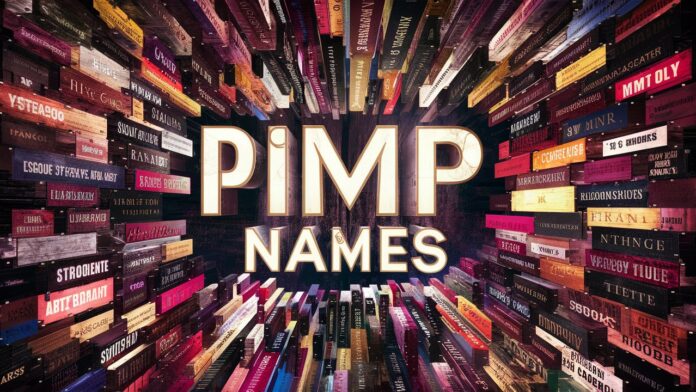The world of street culture, hip-hop, and cinematic lore is steeped in larger-than-life personas, and few monikers carry as much mystique as the pimp name. More than just an alias, a pimp name is a crafted identity—a fusion of intimidation, charisma, and theatrical flair designed to command respect and project dominance. These names aren’t random; they’re linguistic weapons, blending humor, menace, and cultural symbolism. From the gritty realism of urban history to the flamboyant portrayals in blaxploitation films, pimp names have transcended their origins to influence music, fashion, and vernacular slang. This article delves into the anatomy of these infamous titles, exploring their evolution, symbolic power, and lasting imprint on popular consciousness.
The Historical Roots and Street Etymology of Pimp Names
The genesis of pimp names lies in the underground economies of early 20th-century American cities, where pimps operated as both entrepreneurs and enforcers. These aliases served practical purposes: evading law enforcement, establishing brand recognition in illicit markets, and cultivating an aura of invincibility. Names like “Iceberg Slim” (inspired by cold, unyielding detachment) or “Bishop Don Magic Juan” (merging religious authority with conjuring trickery) weren’t just labels—they were psychological armor. Street etymology played a crucial role, drawing from African American Vernacular English (AAVE), jazz slang, and hyperbolic imagery. “Gator” implied predatory ruthlessness; “Sweet Jones” juxtaposed charm with menace. This linguistic alchemy transformed vulnerability into legend, embedding these names in oral histories and later, in hip-hop’s DNA as emblems of survival and hustle.
Linguistic Craftsmanship: Phonetics, Rhythm, and Symbolic Resonance
A masterful pimp name operates like a sonic boom—it hits the ear with unforgettable rhythm. Alliteration (“Silver Tongue Slim”), assonance (“Pretty Tony”), and consonance (“Slick Rick”) create musicality, making names roll off the tongue with percussive force. Symbolism is equally vital: animal references (“Foxxy Cleopatra” for cunning allure), precious metals (“Goldie” for value), or weather motifs (“Storm” for unstoppable force) evoke visceral reactions. The name “Daddy Cool” blends paternal authority with unflappable poise, while “Magic” prefixes (e.g., “Magic Sam”) suggest supernatural control. These elements aren’t arbitrary; they weaponize language to project dominance, turning syllables into psychological warfare that intimidates rivals and captivates audiences.
Media Amplification: From Blaxploitation to Mainstream Iconography
Blaxploitation films of the 1970s catapulted pimp names into pop mythology. Characters like “Shaft” or “Super Fly” became antiheroic icons, their names synonymous with rebellion against systemic oppression. This era cemented tropes: fur coats, cane swords, and aliases dripping with bravado. Hip-hop later adopted this lexicon, with rappers like Snoop Dogg (whose moniker nods to his smooth, canine-cool persona) and Pimp C (a truncation of “Pimpalicious”) repurposing pimp imagery as symbols of autonomy. Even comedy embraced it—Dave Chappelle’s “Silky Johnson” satirized the trope’s extravagance. Media didn’t just report these names; it ritualized them, turning street titles into archetypes of resistance, entrepreneurship, and performative masculinity.
Socio-Cultural Significance: Power, Parody, and Paradox
Beneath the glitter, pimp names reveal complex power dynamics. They reclaim identity in marginalized communities, transforming systemic anonymity into self-authored notoriety. Yet they also parody societal hierarchies—mimicking royal titles (“King Pleasure“), military ranks (“Captain”), or corporate honorifics (“Boss”). This duality mirrors a paradox: they empower through self-mythology while critiquing exploitation. In queer ballroom culture, figures like “Paris Dupree” repurposed pimp aesthetics into voguing houses, showcasing adaptability. Today, these names spark debates about cultural appropriation versus homage, reminding us that their resonance stems from a legacy of resistance, even when shrouded in controversy.
Crafting Your Alter Ego: Principles of Pimp Name Creation
Inventing a compelling pimp name requires strategic self-mythology. Start with archetypes: Are you a “Smooth Operator” or a “Fearless Enforcer”? Fuse traits with vivid nouns—”Midnight” for mystery, “Razor” for sharpness. Test phonetic flow; “Lucky Luciano” lingers longer than clunky alternatives. Context matters: “Sir” or “Big” prefixes add gravitas (e.g., “Biggie Smalls”). Avoid clichés (“Money Mike”); instead, hybridize unexpected concepts like “Phantom Lord” or “Velvet Thunder.” Ultimately, the name must embody your desired aura—whether for a rap persona, a burlesque alter ego, or creative branding. It’s not about literal pimping; it’s about channeling audacity.
Conclusion: The Enduring Legacy of a Loaded Lexicon
Pimp names endure because they distill human ambition into linguistic spectacle. They are artifacts of subculture that infiltrated mainstream veins, blending menace with artistry. While rooted in a troubling history, their evolution—from survival tactics to satirical memes—highlights language’s power to redefine identity. In music, film, and street lore, these monikers remind us that a name can be armor, a joke, or a revolution. They challenge us to consider how titles shape perception, proving that even in fiction, a well-forged alias wields real influence.
Frequently Asked Questions
Q: Are pimp names only associated with criminal activity?
A: Historically, yes—they emerged from underground economies. However, modern usage is largely cultural or parodic. Rappers, drag queens, and performers adopt similar aliases to project confidence, humor, or social commentary, divorcing the trope from its origins.
Q: Why do many pimp names use animal or weather references?
A: These symbols convey primal traits. “Snake” implies stealth; “Typhoon” suggests chaos. They offer shorthand for complex personas, leveraging universal associations with nature’s raw power.
Q: Did real-life pimps inspire blaxploitation films?
A: Absolutely. Figures like Iceberg Slim (Robert Beck) penned autobiographies detailing pimp hierarchies. Films like The Mack (1973) drew from these narratives, blending reality with theatrical excess.
Q: Is it offensive to create a “pimp name” for fun?
A: Context is key. If used to mock marginalized groups or trivialize exploitation, yes. But as creative self-expression (e.g., gamertags or stage names), it can celebrate linguistic inventiveness without endorsing harm.
Q: How do pimp names differ from other street aliases?
A: They emphasize theatrical control and charismatic authority. While a gang alias might focus on loyalty (“Lil’ Cuz”), a pimp name centers on personal brand mastery—e.g., “Fancy McCoy” oozes calculated extravagance.
Q: What’s the most iconic pimp name in pop culture?
A: “Dolemite” (Rudy Ray Moore) remains legendary. The name fused “dole” (misery) and “mite” (small force), ironically symbolizing an underdog who weaponized wit—capturing the essence of the genre.


